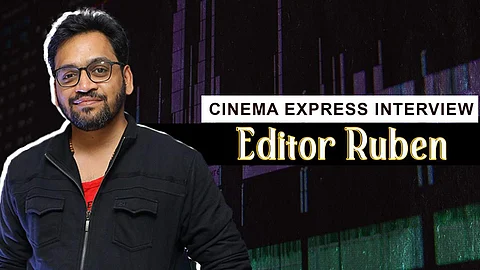

Making commercial entertainers, especially those that cater to people of all ages, is no walk in the park. Such films need to have something for everyone, and the more calculated the process is, the more unsuccessful the product, apparently. Editor Ruben, whose credits include quintessential masala entertainers like Vedhalam (2015), Mersal (2017), Viswasam (2019), Bigil (2019) and Annaatthe (2021), has a delicious working theory when it comes to editing these films. “It is like cooking biryani for a wedding that has to satisfy everyone from a kid to an elderly person. Be it the spices or the salt, the proportion should be measured perfectly,” says Ruben over a video call from Mumbai, where he is currently working on his frequent collaborator Atlee’s next, Jawan, starring Shah Rukh Khan. “While editing, we try to think like the audience. For example, as the grasping power varies from children to elders, it necessitates a certain level of exposition. Most editing choices are done keeping the viewers in mind. In Sardar, for instance, there was a beautiful conversation between Sardar and Cockroach (Yugi Sethu). When one of them asks 'how can we control water with a plastic bottle?', the other responds with ‘why can’t it be done when the population can be controlled using rubber?’ It was a great analogy, but as a kid would not understand it, we let it go.”
PS Mithran’s Sardar, his third collaboration with the filmmaker after Irumbu Thirai (2018) and Hero (2019), was a tough task for the editor, considering the density of this script full of characters and subplots. “I would call this film a blend of information and emotion,” Ruben says. “There are two primary characters—Sardar and his son, Vijay Prakash—and both characters get parallel tracks throughout the narrative. And then, there is the film’s main conflict about plastic water bottles, which we didn’t want to present like a documentary with too much information. This blend was the biggest challenge. That’s where Timmy’s character turned out to be so resourceful.”
It is interesting to note that Ruben talks more like a screenwriter than an editor. In fact, he admits to being fascinated by screenwriting. His Twitter bio incidentally reads, ‘screenwriter’. “I am an accidental editor. As a Viscom student familiar with computers, I just happened to join editor Anthony as an assistant and just went with the flow. Well, here we are now!” Ruben says, with a smile. “I hope to begin pre-production of my directorial venture by next year. People only know me as an editor, and I don’t seek credit for screenwriting either. Writing is a passion. I was one of the dialogue writers of Sam Anton’s Gurkha (2019). I have written scripts that I want to direct and produce. Naraiya goals irukku,” Ruben says. “In fact, filmmakers like Sam Anton and PS Mithran treat me more like a writer.”
The editor’s choices are aimed primarily at creating a smooth viewing experience. Be it the amount of violence or the volume of information contained in a film, his approach is quite holistic. “We were clear about avoiding graphic visuals in Sardar. We didn’t want audiences to be disturbed. Even with the dialogues, we restricted ourselves. We also chose to emphasise elements that could be registered easily. For instance, kids get easily attracted to colours, and we knew they would easily understand that the letter in Timmy’s hand is the ‘red letter’ that’s crucial to the plot. However, we weren’t sure how to explain this point to adults, and to achieve that, we mention this point multiple times throughout the film. Mithran agreed to this choice, and we felt the spoon-feeding was necessary here because of the technicality of the concept.”
It is also clear from the conversation that Mithran respects Ruben’s creative decisions, even if they are as huge as changing the intermission sequence on the editing table. A major action stretch that opens the second half—featuring both characters played by Karthi, cut parallelly—was originally conceived as the interval bang. “But then, we felt that giving a break after introducing Sardar’s character and establishing all the plot points would help the viewer follow the second half better. Mithran and the whole team were initially stubborn, but I was firm about this choice.”
The editor is now set to foray into Hindi cinema with Shah Rukh Khan’s Jawan and believes it’s too early to talk about the project. However, he does share that the Atlee-directorial is “shaping up well.” Ruben reveals, “Half of the shoot is complete, and we are also editing the film as we shoot since it involves extensive VFX work. Stunt directors from around the world, including those who have worked on films like Mad Max: Fury Road and the Fast and Furious franchise, are working on this project. It has all the elements that will make for a grand commercial entertainer catering to everyone across the country,” an excited Ruben says. How does it feel to edit for a whole new demography? “Audiences are the same. It’s about understanding the star of the film, their universe, the patterns in their previous films, what worked in them, what didn’t work, and how our offering is different from the rest. Once you take all these factors into consideration...” he tapers off. A less modest editor might have gone on and said, “—the film can be as successful as Sardar has turned out to be.”